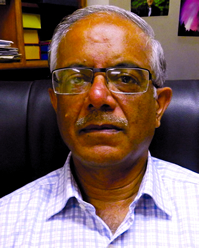Patients with acute onset arthritis may not have traditional rheumatologic disease. There is a growing possibility that they are suffering the after effects of infection by chikungunya virus.

“Chikungunya was once thought to be a tropical disease, limited to the hotter parts of Africa and Asia,” said Arvind Chopra, MD, DNB, Director and Chief Rheumatologist at the Center for Rheumatic Diseases in Pune, India. “In the last nine years, we have seen chikungunya break its geographic bounds. Cases are being reported in Europe and in the United States. Some patients develop persistent aches and pains that can easily be confused with rheumatoid arthritis or some other arthropathy. Arthritis caused by chikungunya can be a significant management challenge.”
Dr. Chopra will explore the developing problem of chikungunya-caused arthropathy during the clinical symposium Coming to a Joint Near You: Chikungunya today from 8:30 – 10:00 am. Kate Ryman, PhD, Associate Professor of Microbiology & Molecular genetics at the University of Pittsburgh Center for Vaccine Research, will discuss what is known of the immunopathogenic mechanisms of chikungunya arthritis.
Dr. Chopra experienced chikungunya during a 2006 epidemic in India. Clinicians and researchers were totally unprepared.
“Most of us didn’t even know how to spell chikungunya,” he said. “The only time we had ever heard of the virus was as an obscure tropical disease during medical training, the kind of disease we all forget because we never see it. Three or four months after the epidemic raged, we were inundated with all kinds of rheumatological syndromes from vague joint and back pains to inflammatory syndromes that looked like rheumatoid arthritis or different kinds of spondyloarthropathies.”
Dr. Chopra and other clinical researchers launched intensive investigations of the natural history of chikungunya and its arthritis-like complications. Chikungunya is an arbovirus, transmitted by the Aedes aegypti mosquito and, more recently, by the more cold-tolerant Aedes albopictus mosquito. This additional vector may account for the recent geographic spread of the virus from the tropics into more temperate regions.
Chikungunya is related to dengue, found worldwide, and Ross River virus, seen only in Eastern Australia. All three present with excruciating joint and soft tissue pain, although most chikungunya patients recover within two to three weeks.
Infection with the chikungunya virus triggers an intense cytokine response. Patients typically show elevated levels of TNF, IL6, IL13, and other cytokines usually seen in patients with acute rheumatoid arthritis, Dr. Chopra said. The most clinically significant difference between acute RA and acute chikungunya arthritis is the lack of autoantibodies in chikungunya.
Treatment also differs, at least in the short term. While chloroquine is often used to treat RA, it is no more effective than NSAIDs for treating the persistent aches and pains of chikungunya during the first six months. There are no randomized clinical trial data on the comparative effectiveness of different agents for longer-term treatment of chikungunya.
“Because chikungunya produces predominately musculoskeletal aches and pains, and some patients will persist with rheumatological symptoms, it is important for rheumatologists to keep this virus in the differential diagnosis when presented with acute onset of rheumatism and soft tissue aches,” Dr. Chopra said. “Chikungunya is a very close mimic of RA, and in particular its seronegative (rheumatoid factor) form. The patient may present with classic rheumatoid symptoms and a history of chikungunya, and the serology with elevated acute-phase reactants will be almost identical with RA.”
Chikungunya patients almost never test positive for autoantibodies, however, and chikungunya also produces significant soft tissue damage. Patients often have puffy hands and feet, heel pain, and pain around the wrists and ankles.
“That periarticular involvement can be another clue that we are dealing with chikungunya and not an autoimmune arthritis,” Dr. Chopra said.
